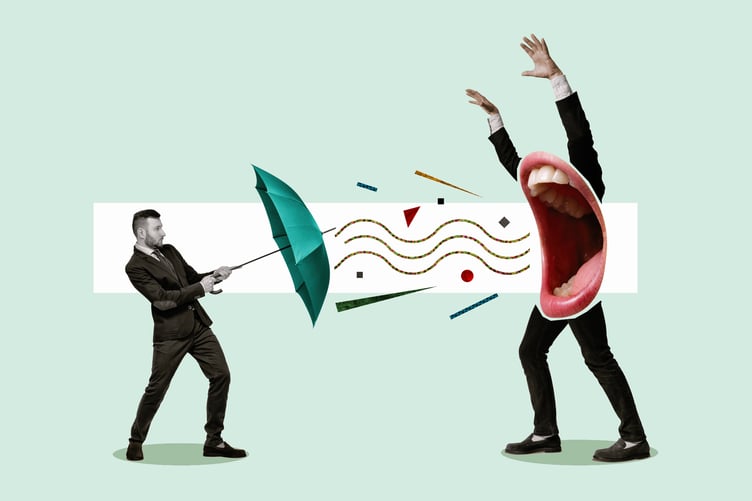Hello, and welcome to part two of how to have a conversation with a climate change denier. If you are a denier (for lack of a better word) and reading this, then you may think it a load of codswallop - I'm not allowed to write bullshit - but hopefully it's codswallop that's at least being expressed in a respectful way. I personally believe in climate change, but I know how infuriating it can be having someone try and explain to me why something I don't believe in is the wrong opinion...like Mrs Brown's Boys.
It's easy to tarnish all deniers with the same brush, but there are a variety of different mindsets behind not being a climate change believer, none of which should be demonised. There are different types of climate deniers.
The Out-and-Out Conspiracy Theorists
This particular type of denier often believes government is making up climate change in order to control us. If not global governments, it's the lizard people, the New World Order, or the Jews who are usually blamed for the invention of climate change for their own gains to the detriment of everyone else. And these people are the only one who see it. They're the climate change equivalent of missionaries, only missionaries come across a lot more polite.
These guys have a habit of being the loudest voices online. You’ll likely (and ironically) find a comment under this article, or any about climate change, by someone aggressively shouting down the advocation for a liveable planet, dismissing it as pushing ‘DISGUSTING WOKE PROPOGANDA BY THE GOVERNMENT.’ Unknowingly, many of these loud online voices belong to people who, unknowingly, suffer from Dunning-Kruger effect; where people with ‘limited competence in a particular domain overestimate their abilities.’ So, next time you're doing a 5k for charity, forget Hospice IOM, think about donating to research into curing this devastating disease instead.
Passive/ Dismissive Deniers
As suits their loud, angry nature, a lot of the time it’s the conspiracy deniers that hog most of the spotlight when it comes to highlighting people who have a different thought process to climate change. But the most common type of climate denial is more passive/dismissive. Climate psychologist and writer Jessica Kleczka describes this as when people are aware that climate change exists but don't care about it or avoid the subject altogether. Kleczka believes climate denial can often stem from a place of fear, saying; ‘Because climate change can seem too enormous of a threat to tackle as an individual, hostility is instead directed towards those advocating for climate action.’
It's why we find comfort in disaster movies revolving around climate change - The Day After Tomorrow, Don't Look Up, The Day The Earth Stood Still, 2012 - they deal with climate change with a neat storyline and good looking people. Because those are the only ones that matter. Each film follows the same formula:
Beginning: Something weird starts happening with the weather.
Middle: Everything is turning to shit in a really dramatic way.
End: The climate change has stopped and humanity must now repair itself or the world ends completely and people find a new planet to ruin (Don't Look Up).
Covering climate change with a clear beginning, middle, and end narrative makes the magnitude of it a lot easier to digest than the reality - an ongoing, sprawling, multi-faceted ball of chaos and confusion. People respond to this threatening ball of confusion in various ways, often falling into the inbuilt fight, flight, or freeze modes. While some respond to the climate crisis by fighting it (e.g. by engaging in activism or fighting against the notion of climate change), many experience a freeze (ha, the irony) response (e.g. fear and inability to act), or a flight response (avoiding the problem altogether). Often people don't even realise they're having a response, it happens unconsciously, which isn’t very helpful when it comes to communication.
Climate Doomers
Climate Doomers believe the world has already lost the battle with climate change and there's nothing we can do to reverse it. Like that guy from the Disney film Hercules who walks around wearing a sign and ringing a bell shouting 'THE END IS COMING'. They think humans just have to accept their fate and become extinct like the Dodos and the dinosaurs. An understandable reaction in the face of something so huge, but which leads to climate inaction, which doesn't help heal the world, and make it a better place for you and for me and the entire human race.
Climate Delayers
This one's more about fossil fuel industry bigwigs and politicians; those powerful people at the top pulling strings behind the scenes in the hope they can redirect responsibility onto the everyday person rather than doing anything themselves, despite them being the ones able to make the biggest impact. It's done in a bid to delay action against climate change and make a load of cash in the process.
It's good to keep these different types of motivation in mind when bumping heads with a climate change denier and the debate that follows, so you have more of an idea on where the other person's point of view could be coming from. It's also helpful to remember people's values, religions, and political stances have a large part to play. Climate change isn't just environmental. OF COURSE IT ISN’T. THAT’D MAKE THINGS TOO EASY. It's political, ethical, and, for many, religious. A lot of the time climate deniers aren’t coming from a place of knowledge following thorough scientific research, but one of tribalism based on their worldviews – political and religious standpoints - alongside potential complacency and/or fear.
Coming up next week, we’re looking at tactical ways to have a chat with someone you disagree with in a way that’s respectful. Plus, ADDED BONUS MATERIAL: Why Anyone Who Thinks Mrs Brown's Boys Is a Good Show Is an Idiot.


.jpeg?width=209&height=140&crop=209:145,smart&quality=75)
.JPG?width=209&height=140&crop=209:145,smart&quality=75)
